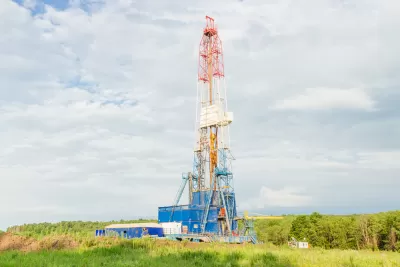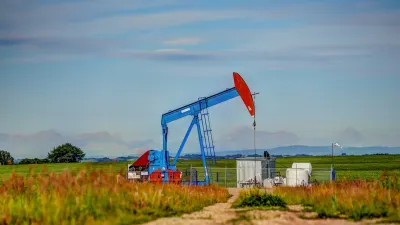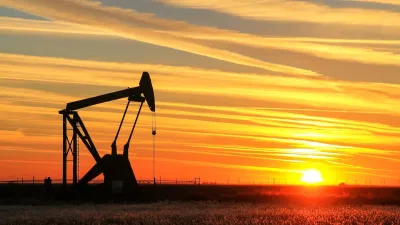A railway project designed to move oil and gas across eastern Utah has received millions in grant money from a fund designed to mitigate the impacts of fossil fuels.

A proposed fossil fuel railwayin Utah is receiving $28 million toward an environmental impact survey that will help push the project forward, but opponents argue that the grant defies the mission of the agency distributing it.
The Utah Permanent Community Impact Fund, created to "alleviate the boom and bust cycle of energy production" and help communities recover from the effects of oil drilling and mineral extraction, has traditionally granted funds for public infrastructure projects like medical facilities and road improvements. The Center for Biological Diversity and Living Riversare suing to block the grant from contributing to more fossil fuel infrastructure in the state, arguing that using the money to develop the railroad goes against the intended purpose of the fund. Residents concerned about potential erosion, mudslides, and fires caused by construction activities want to see the money used for mitigating measures, and opponents of the railway argue that any short-term benefits to the local economy are outweighed by the risks to local wildlife, habitats, and communities.
The lawsuit, if successful, could set stricter standards for how mitigation funds like the Community Impact Fund distribute grants and prevent revenue meant for community projects from ending up with fossil fuel corporations.
FULL STORY: Lawsuit over proposed fossil fuel railway in Utah moves forward

Manufactured Crisis: Losing the Nation’s Largest Source of Unsubsidized Affordable Housing
Manufactured housing communities have long been an affordable housing option for millions of people living in the U.S., but that affordability is disappearing rapidly. How did we get here?

Americans May Be Stuck — But Why?
Americans are moving a lot less than they once did, and that is a problem. While Yoni Applebaum, in his highly-publicized article Stuck, gets the reasons badly wrong, it's still important to ask: why are we moving so much less than before?

Using Old Oil and Gas Wells for Green Energy Storage
Penn State researchers have found that repurposing abandoned oil and gas wells for geothermal-assisted compressed-air energy storage can boost efficiency, reduce environmental risks, and support clean energy and job transitions.

Greening Oakland’s School Grounds
With help from community partners like the Trust for Public Land, Oakland Unified School District is turning barren, asphalt-covered schoolyards into vibrant, green spaces that support outdoor learning, play, and student well-being.

California Governor Suspends CEQA Reviews for Utilities in Fire Areas
Utility restoration efforts in areas affected by the January wildfires in Los Angeles will be exempt from environmental regulations to speed up the rebuilding of essential infrastructure.

Native American Communities Prepare to Lead on Environmental Stewardship
In the face of federal threats to public lands and conservation efforts, indigenous groups continue to model nature-centered conservation efforts.
Urban Design for Planners 1: Software Tools
This six-course series explores essential urban design concepts using open source software and equips planners with the tools they need to participate fully in the urban design process.
Planning for Universal Design
Learn the tools for implementing Universal Design in planning regulations.
Heyer Gruel & Associates PA
City of Moreno Valley
Institute for Housing and Urban Development Studies (IHS)
City of Grandview
Harvard GSD Executive Education
Salt Lake City
NYU Wagner Graduate School of Public Service
City of Cambridge, Maryland




























